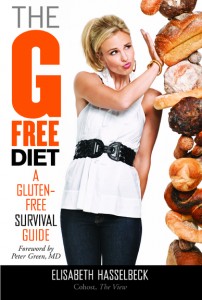 Going gluten-free is the latest glorified diet trend which has gained even more momentum with The View co-host, Elisabeth Hasselbeck’s, G-Free Diet book. You’ve seen specialized cookbooks while browsing the bookstore, and you’ve probably noticed an increase in gluten-free food offerings in your supermarket and on restaurant menus. So what’s the real deal? Does gluten actually have the bad rap it’s made out to have or is this just another baseless fad?
Going gluten-free is the latest glorified diet trend which has gained even more momentum with The View co-host, Elisabeth Hasselbeck’s, G-Free Diet book. You’ve seen specialized cookbooks while browsing the bookstore, and you’ve probably noticed an increase in gluten-free food offerings in your supermarket and on restaurant menus. So what’s the real deal? Does gluten actually have the bad rap it’s made out to have or is this just another baseless fad?
Gluten is a protein found in wheat, rye, and barley. In addition, many oats are contaminated by gluten due to processing in the same mills, so avoiding gluten often means avoiding heart-healthy oats as well. It can be hidden in more than 300 ingredients and additives, so going gluten-free is an intense lifestyle decision. Gluten-free products rely on such grains as amaranth, corn, rice, quinoa and potato flour. While up to 25% of Americans are requesting gluten-free foods, only 1% of the population actually needs them: those with celiac disease.
People with celiac disease suffer an autoimmune response to gluten, which results in damage to the intestinal villi that are responsible for nutrient absorption. Symptoms include diarrhea, bloating, weight loss, and slowed growth. If nutrient malabsorption continues, osteoporosis, neurological disorders, and some types of cancers can result. If you suspect you have celiac disease, it is important to consult a doctor prior to beginning a gluten-free diet, otherwise any test results will return inaccurately.
Just keep in mind, unnecessarily eliminating gluten from your diet, without a medical reason, can have potential negative effects on your health. Wheat is high in fiber, iron, and B vitamins that are not found in refined gluten-free baked goods. Weight loss associated with going gluten-free is often due to dieters simply cutting out carbohydrates without replacing their caloric value. In fact, it is possible to gain weight on a poorly planned gluten-free diet: gluten-free cookies are still cookies, after all.
Unless you have celiac cisease, there is little reason to subject yourself (or your wallet) to a tedious and expensive gluten-free diet. Instead, simply focus on getting a range of complex carbs throughout your day: wheat, oats, quinoa, spelt, amaranth, barley. Some have gluten and some don’t, but they’re all a perfect, healthy fit for your balanced diet. If you are considering going gluten free- one the best dietitians to help you is Shelly Case [1]. Good luck!
